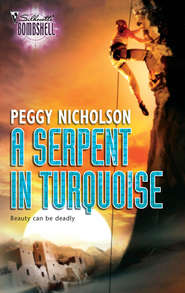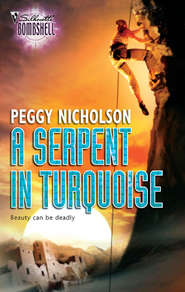По всем вопросам обращайтесь на: info@litportal.ru
(©) 2003-2024.
✖
The Wildcatter
Автор
Год написания книги
2018
Настройки чтения
Размер шрифта
Высота строк
Поля
Standing there in a pair of old engineer’s lace-up leather boots! Tankersly snorted. “Not what I need.” If this one didn’t answer to the rein, he wouldn’t do in spite of his looks. Ben had enough trouble this summer without signing on an outlaw. “You’ll buck bales or you can be on your way.”
Heydt nodded impassively, but something was moving at the back of his dark eyes. “When I’m not haying, on my own time can I ride?”
To Ben’s mind, any minute of life not spent in the saddle or in bed with a laughing woman was wasted. Still, his gaze sharpened. With those shoes, Heydt was no cowboy. But neither was he one of those wet-behind-the-ears dreamers who’d yet to find himself—though what kind of fool ever lost himself? Heydt was too old, too toughened, too savvy to be seeking a romantic new career the way some city slickers did every summer, to the locals’ amusement.
So what’s he want? Looking down at those steady eyes in the too-controlled face, Ben knew that asking would get him nowhere. He’d have to wait and see. “Why not,” he agreed with a shrug, though he knew one good reason why not. After a day of haying, even the strongest man nodded asleep at the supper table.
He touched spurs to the buckskin and headed off toward the lower pastures. “Reckon he’ll do,” he told his foreman as he passed him. “Sign him up. And Joe,” he called back over his shoulder, “come evening, if he still wants it, Heydt gets a horse.”
CHAPTER THREE
WHENEVER FEAR or sorrow or confusion nibbled at her courage, Risa Tankersly reached for her camera. Through the lens of her ancient Nikon, somehow the harshness of the world was softened, or at least pushed back to a manageable distance. Framed in the viewfinder, half-perceived patterns became clear. Pain or chaos or uncontrollable events could be frozen into a sixteenth-second snapshot—frozen, reduced to a palm-size glossy rectangle, then tucked away out of sight and mind in one of the manila envelopes where she stored her photos until she felt strong enough to deal with them.
The Nikon had been Risa’s escape hatch from the world since the summer she’d turned thirteen. One of her mother’s last boyfriends, a cameraman with a minor studio, had left it behind when he stormed drunkenly out of their lives one night after a raging exchange with Eva about who should pay the pizza deliveryman. The next morning Risa’s red-eyed and stumbling mother had dumped his camera bag in the trash can along with the rest of his possessions.
When her mother wandered back to bed, Risa had stealthily retrieved it, then hidden it under the T-shirts in her bureau drawer for a month—until Eva’s next lover had come along to erase the last one from mind. Only then had Risa dared to bring out the camera and start—at first timidly, then with growing fascination—to explore the Nikon’s possibilities.
The lovely old Japanese camera, with its scratched case, silken action and merciless, all-seeing lens, had been her best friend and confidant ever since. Had served her faithfully in the wrenching year that followed its coming, when her mother died and a tall, acid-tongued cowboy old enough to be her grandfather stalked into her life, claiming to be her daddy. Whisking her out of the helter-skelter gay and sorrowful world she’d always known, back to his enchanted kingdom called Suntop.
A world where fourteen-year-old Risa didn’t know the players, the rules or even how to mount the standard means of transportation. A world where she’d come too late to ever quite belong.
Five years later, the Nikon was still a comfort and a consolation.
An hour before dawn Risa finally gave up the struggle for sleep. She slipped into her jeans and a green, pearl-snap western shirt, brushed her tousled, flyaway hair, grabbed her camera bag and set out to greet the first rays of the new day on Suntop Mountain.
Better, she told herself, pausing on the terrace to breathe deep the chill pine-scented air. Out from under her father’s roof, she felt better already.
She took the stone steps in two long-legged bounds and strode off down the track. She’d have to hurry to make it to the summit by sunrise.
Passing close under the windows of the guest wing, she glanced upward, half fearfully, half wistfully. If Eric had spent as restless a night as she had… If he now happened to be leaning out his window, contemplating the east, where the sky was already fading from Prussian blue toward a heart-catching turquoise…
But his window was closed against the dawn. Eric wasn’t a lark as she was. Likely he’d sleep till she knocked on his door and coaxed him down to breakfast.
A faint frown drew her dark eyebrows together. He hadn’t been very happy with her when he’d rejoined her on the landing last night. Whatever Ben had said to him after he’d summoned Eric into the library must have stung. Ben had a tongue like a rawhide lash and he didn’t hesitate to use it.
But what was I to do? Ben was a tyrant, used to having his way around Suntop. Certain the rest of the world beyond the ranch’s boundaries would also bend to his rock-bound will. No wonder Eric and her father were clashing–two strong men, from such different worlds…
And Risa caught in the middle, loving them both. She’d spent the night worrying how to do this. How to smooth the way between them. How to make Ben see how wonderful her man really was. Yesterday had been quite a setback.
She blinked, surprised to find that her brooding had carried her as far as the west shoulder of Suntop. And now for the hard part. She gulped in a breath and started up the horse trail that climbed the slope in switchbacks. Hurry! It could only be minutes before sunrise. No point to this exercise if she wasn’t there to greet it.
Robbed of her mountain endurance by nine months at sea level, Risa arrived panting and light-headed on the grassy, rounded summit of Suntop.
Slowly she rotated, glorying in the three-hundred-sixty-degree view, greeting each landmark below in turn, saving the east as she always did for last. Oh, she did love Suntop, and she’d missed it terribly, for all the eagerness with which she’d fled the ranch last September. Someday soon she’d have to bring Eric up here to show him all this.
With that thought she swung east, and she’d timed it perfectly. The first rays of the rising sun swept through the notch in the far-off Trueheart Hills, to strike this enchanted summit, this spot and this alone, with the first light of day—a stroke of gold like a private benediction, a sizzling splash of fairy dust, while all around it the world lay sleeping in purple shadows. Suntop.
“Yes!” Laughing delightedly, Risa spread her arms wide to welcome the sunshine and turned in the light. She should take a picture, but for once she needed no layer of glass between her and the world. it was simply enough to be and be here.
Dizzy with her twirling, laughing softly to herself, Risa stopped, opened her eyes—and found herself staring straight into the eyes of a stranger. The fine hairs shot up along her nape and her breath whooshed out in a startled gasp. She’d spent too many recent months in New Haven, where suddenly encountered strangers could be muggers or worse.
But this is Suntop, she reminded herself, where her father called her and her sisters “Princess.” Here of all places she was safe, if not always happy. She unfisted her hands.
“Cielo,” the man said quietly, and nodded—an oddly courtly gesture.
Spanish. “Yes, it is,” she agreed. “It’s heaven, or ’bout as close as you can get.”
In the light now sifting down the mountaintop, his smile was a slash of white against his tawny skin. Even as she watched, the sun touched his straight, shaggy hair to bronze, his face to ruddy gold.
There was enough light to see his dark eyes, and the amusement in their depths. “That is what it means, isn’t it?”
“Yes, heaven—that’s exactly what it means.” Big hands casually hooked in his back pockets of his jeans, he sauntered uphill to join her.
Risa had an impulse—born from who knows where—to turn and run…run bounding and panting down the far side of Suntop toward the safety of her father’s house.
She stood, eyes narrowed, blood thrumming through her veins, and leaned slightly back on her heels, but still held her ground. Pinned in place by her pride. Then it hit her. “You’re—!”
The cause of all her misery yesterday! The outing to Mesaverde had been utterly spoiled. “You’re the man in the truck!”
“Ah. I thought that might have been you. How many women around here could have hair like a tequila sunrise?” With one last stride he stood before her. “And how’s the car?”
That blasted car. It was Eric’s shiny new toy, a gift from his father on his graduation from Yale Law School last month. After he’d seen the damage, Eric had been in a black rage for most of the morning. “It has a dent in its door. Quite a large one.”
She’d tried at first to hint to Eric that it had been his own fault for driving so close to the man—this man. He’d been outraged that she’d think so, called her disloyal. Whose side was she on?
“But I don’t see it as sides,” she’d protested, retreating immediately from his anger. “I just didn’t think it was worth anyone’s being hurt.” She still didn’t. How silly to argue over right-of-way, like two Rocky Mountain bighorn rams butting heads on a one-goat trail.
“Good. Perhaps that will teach your friend to watch his temper.”
Hardly. After she’d realized how furious Eric was, she’d done her best to back away from their disagreement. In the six months they’d been courting, they’d never had a real lovers’ quarrel. This had seemed such a stupid subject for their first fight—a one-time event caused by a stranger who’d blundered into their charmed circle for a few unpleasant minutes, but now was gone for good.
Or so she’d thought.
“Well, Eric said the whole thing was your fault, actually. He says the uphill car always has right-of-way.” She’d never heard that rule before, but then, Eric knew so many things that she did not. It was one of the reasons he’d first attracted her. He seemed so assured, so at home in the wide, daunting world into which she’d been thrust when she’d gone East to college.
“Oh, well, if Errrric says so…” The corners of the stranger’s mouth curled wickedly as he rolled his r’s. He had a very…arresting mouth for a man, with a beautifully carved, full bottom lip and a certain mobility of expression that was unlike the typical cowboy’s poker face. Or an Ivy Leaguer’s stiff upper lip. And once noticed, that mouth could not be ignored. It drew her eyes like a magnet. She frowned to break its spell.
“And when he tried to run me down?” the stranger continued too politely. “I suppose there, also, it was my fault?”
“He didn’t try to run you down.” Eric had insisted on that, loudly and at length, till finally she gave in and admitted that perhaps only her viewing angle had made the encounter appear so horribly close. “He was headed for the gate—we were on a straight-line course for it—and he…naturally he assumed you’d step aside.” As much as Eric had insisted on that, too, she’d had in the end to believe him. If you loved somebody, you had to believe in him. Trust him.
“That’s what he…assumed?”
He was giving her the lie, just by the tone of his low mocking voice. She hooked her own thumbs in her jeans pockets and tipped her chin up a haughty half inch. “Yes.”
“I have—had—a friend who used to say, ‘Never assume. It makes an ass out of “u” and me.’”
Arguing with an arrogant stranger was no way to spend a gorgeous dawn. She drew herself up—an action that put her on a level with most men’s eyes. But not this one. “Oh? Well, while we’re assuming, may I assume you have some very good reason for being here on Suntop? My father said you weren’t one of his hands.”











